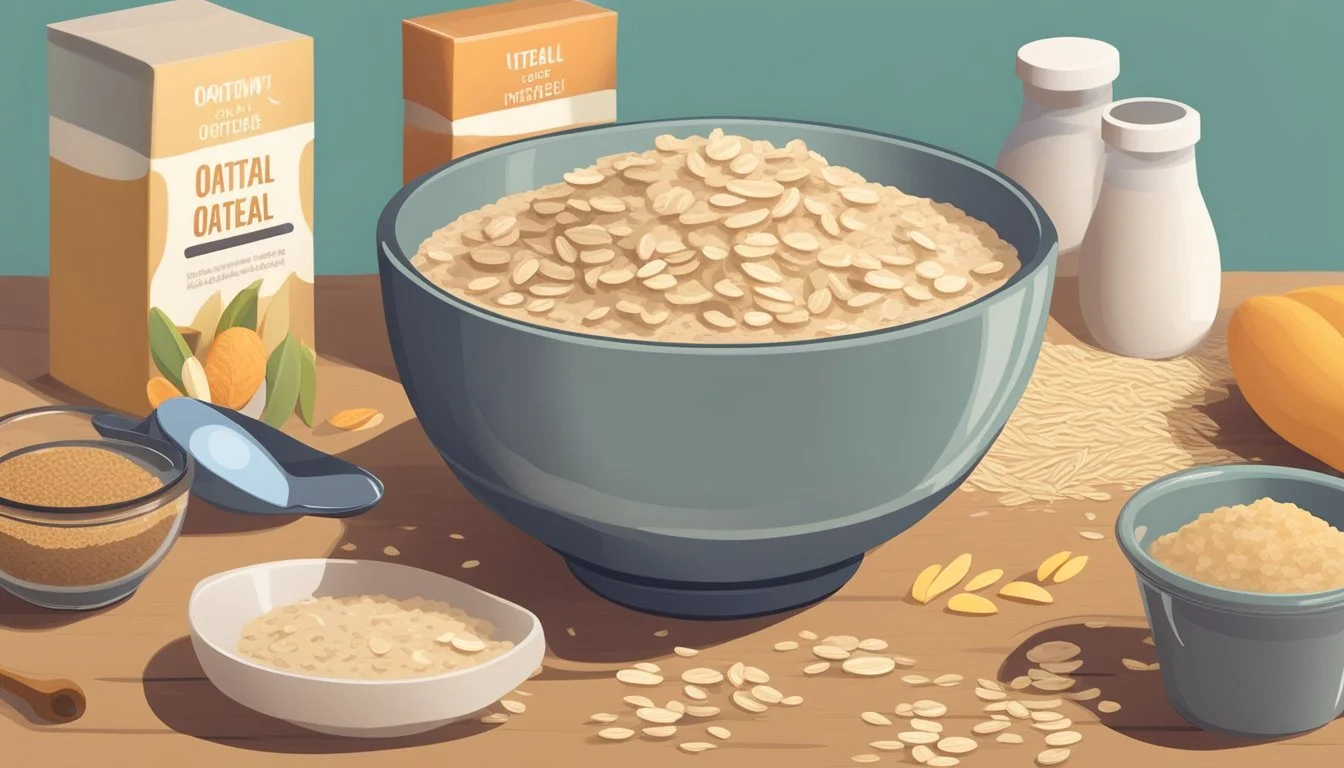Soothing Bites: Gentle Foods That Help Calm an Upset Stomach
Experiencing an upset stomach can be both uncomfortable and disruptive. There are numerous factors that can contribute to such discomfort, ranging from food intolerances to stress. For those looking to alleviate these symptoms through dietary choices, understanding which foods to incorporate and avoid can play a crucial role.
Choosing the right foods can significantly ease digestive discomfort. Proper dietary selections not only help relieve symptoms but may also aid in preventing future occurrences. With a variety of natural and accessible options, individuals can find relief and potentially improve their digestive health.
1) Ginger Tea
Ginger tea is a popular remedy for an upset stomach. It is known for its ability to help alleviate nausea and digestive discomfort.
To make ginger tea, boil a cup of water and add sliced ginger. Let it simmer for 15 minutes, then strain the liquid into a cup. This preparation maximizes the ginger's beneficial compounds.
Ginger contains compounds like gingerols and shogaols that can help ease stomach pain and improve digestion. These compounds have anti-inflammatory and antioxidant properties.
While ginger tea is generally safe, drinking it in large amounts may cause indigestion or heartburn in some individuals. It's wise to start with a small amount to see how your body reacts.
Peppermint tea, another option for stomach upset, lacks the warming quality of ginger tea but also offers relief from symptoms like nausea and vomiting.
Ginger tea can be consumed up to four cups daily to help reduce nausea. This natural remedy is especially useful for those experiencing morning sickness or motion sickness.
2) Plain Rice
Plain rice is one of the top choices when dealing with an upset stomach. Its simplicity and ease of digestion make it ideal for those experiencing nausea or diarrhea.
White rice, in particular, is favored because it is low in fiber, which can be gentler on the stomach. It can help in firming up loose stools and soothing the digestive tract.
Cooking rice without any added fats or seasonings is recommended. By keeping it plain, the risk of further irritating the stomach is minimized.
Another benefit of white rice is its ability to absorb excess fluids, which can be helpful during bouts of diarrhea. It acts as a binding food, helping to stabilize the digestive system.
Adding a pinch of salt can assist in maintaining hydration levels, which is crucial during digestive distress. Keeping the meal bland and straightforward ensures it is more palatable and less likely to cause discomfort.
For those who prefer a bit of flavor, pairing rice with a small amount of broth can enhance taste without irritating the stomach. This approach maintains the meal's ease of digestion while providing slight nutritional benefits.
3) Banana
Bananas are a gentle food that can help soothe an upset stomach. They are easy to digest and contain pectin, a type of soluble fiber that can help normalize bowel movements.
Rich in electrolytes like potassium, bananas can help replenish nutrients lost during bouts of diarrhea or vomiting. This can be particularly beneficial in restoring balance in the digestive system.
Bananas are also known for their natural antacid effect. They help neutralize stomach acids and can be a comforting option for those experiencing acid reflux or heartburn.
Their soft texture and mild flavor make them a suitable option for individuals who might find other foods too harsh or irritating. Since they don’t require much chewing, they are less likely to cause irritation to an already sensitive stomach.
4) Chamomile Tea
Chamomile tea is well-known for its calming effects on the digestive system. It can help reduce nausea, vomiting, and indigestion, making it a popular remedy for an upset stomach. This herbal tea is often recommended for its ability to soothe the gastrointestinal tract.
Chamomile contains anti-inflammatory properties which can relieve gas and bloating. These effects make it a gentle option for those dealing with irritable bowel syndrome or other digestive discomforts. The tea can be consumed after meals to aid digestion and promote relaxation.
Some people find that chamomile helps alleviate symptoms of acid reflux. Its soothing properties can ease the irritation in the esophagus and stomach lining, potentially reducing heartburn. As a nervine herb, it also benefits the nervous system, thereby reducing stress-related digestive issues.
The mild nature of chamomile makes it suitable for use by individuals of all ages. However, it's important for individuals with allergies to ragweed or certain plants to exercise caution, as chamomile may cause allergic reactions in sensitive individuals.
5) Peppermint Tea
Peppermint tea is a popular remedy for an upset stomach. It is widely recognized for its soothing properties, which help alleviate digestive discomforts.
The tea is made from the dried leaves of the peppermint plant, known for its strong minty flavor. Drinking peppermint tea can relax the digestive system, making it easier for the stomach to process food.
Peppermint tea is often recommended to reduce symptoms like bloating, nausea, and indigestion. It has natural antibacterial and anti-inflammatory properties that assist in relieving various stomach issues.
Additionally, peppermint tea is free of caffeine, making it a calming and non-stimulating beverage. This herbal tea can be enjoyed at any time of day, particularly after meals to aid digestion.
People with irritable bowel syndrome (IBS) may also find relief from their symptoms by drinking peppermint tea. Its ability to soothe the digestive tract can help reduce the discomfort associated with IBS.
Peppermint tea may also help in promoting the movement of digestive fluids, assisting the body in breaking down food more efficiently. This can result in a quicker and more comfortable digestion process.
The ease of preparation and the natural benefits make peppermint tea a convenient option for those experiencing stomach troubles. Whether using fresh or dried peppermint leaves, it is a simple remedy that can be readily incorporated into a daily routine.
6) Apple Sauce
Applesauce is a gentle food that can help soothe an upset stomach. Made from cooked apples, it is rich in pectin, a type of soluble fiber. Pectin helps to firm up stool and may ease diarrhea.
The low fiber content in applesauce makes it gentle on the digestive system. This can help reduce stomach cramping and ease digestive discomfort.
Applesauce is also part of the B.R.A.T. diet, which stands for Bananas, Rice, Applesauce, and Toast. This diet is often recommended for those experiencing gastrointestinal issues. The smooth texture and mild taste are easy to tolerate.
People prefer applesauce for its natural sweetness and simplicity. It often needs no added sugars or preservatives, making it a wholesome choice.
7) Yogurt (with probiotics)
Yogurt with probiotics is an effective food for soothing an upset stomach. Rich in beneficial bacteria, it helps maintain a balanced gut flora. These probiotics support digestion and can alleviate symptoms like bloating and gas.
The live cultures in yogurt aid in replenishing the gut’s good bacteria. This can be especially helpful after a course of antibiotics, which often disrupt gut microbiota. Consuming yogurt regularly can promote overall digestive health.
Yogurt is also an excellent source of nutrients, including calcium, protein, and vitamins like B-12. For those without lactose intolerance, it is a well-tolerated food that provides essential nourishment.
Opt for plain Greek yogurt or those labeled with live and active cultures. These options typically have higher levels of probiotics and fewer added sugars. Mixing yogurt with other soothing foods like applesauce can further enhance its digestive benefits.
8) Fennel Seeds
Fennel seeds are commonly used to aid in digestion and relieve gas. Known for their antispasmodic properties, they help reduce muscle spasms in the stomach, which can alleviate discomfort.
These seeds have antimicrobial characteristics that can help reduce gut pathogens. Fennel seeds may also reduce inflammation in the digestive tract, making them beneficial for those with an upset stomach.
Chewing fennel seeds after meals is a common practice in many cultures. It can help stimulate digestion and prevent bloating. Fennel seeds contain healthy fibers that support gut health and aid in maintaining a balanced microbiome.
They are also available both whole and powdered. When used in teas or as a spice, fennel seeds can provide relief from gas and bloating.
9) Papaya
Papaya is a tropical fruit known for its vibrant orange flesh and numerous digestive benefits. Rich in enzymes like papain, it aids in the breakdown of proteins, making digestion smoother. This can be particularly helpful for those suffering from indigestion.
Papaya is also high in fiber, which helps regulate bowel movements and prevent constipation. Consuming the fruit can create a more comfortable digestive experience, reducing the frequent bloating and discomfort that can accompany an upset stomach.
The antioxidants and flavonoids found in papaya may also play a role in protecting the stomach lining from damage. Research on animals has shown that these nutrients can reduce the likelihood of developing stomach ulcers, providing yet another layer of gastrointestinal protection.
For those experiencing nausea, papaya can act as a soothing remedy. Its natural enzymes and vitamins contribute to calming the stomach, making it a gentle option for easing digestive distress.
10) Soluble Fiber Foods (like oatmeal)
Soluble fiber can be beneficial for an upset stomach. Foods rich in soluble fiber include vegetables, fruits, grains, nuts, seeds, and legumes.
Oatmeal is a particularly good source of soluble fiber. It contains beta glucan, which has added health benefits including reducing the risk of heart disease. A warm bowl of oatmeal can help soothe digestive discomfort.
Other soluble fiber foods effective for upset stomachs include carrots, broccoli, and green beans. Fruits like apples, pears, and berries also offer significant amounts of soluble fiber. These foods help absorb excess bile, which can alleviate symptoms of bile reflux.
Legumes such as lentils and beans are additional high-soluble fiber options. Including these foods in one's diet supports healthy digestion and can ease stomach discomfort.
Common Causes Of An Upset Stomach
An upset stomach can result from various factors. Two common causes include overeating and food intolerances.
Overeating
Consuming excessive amounts of food can overwhelm the digestive system, leading to discomfort. When a person overeats, the stomach may stretch beyond its normal capacity, causing pain and bloating. Additionally, the digestive process can slow down, making it more difficult for the body to break down food efficiently.
A large intake of high-fat or spicy foods can exacerbate these symptoms, as they require more effort to digest. Chewing food thoroughly and eating slowly can help prevent overeating.
Food Intolerances
Food intolerances occur when the body has difficulty digesting specific foods. Unlike allergies, intolerances typically involve digestive issues rather than immune responses. Common intolerances include lactose, found in dairy products, and gluten, present in wheat, barley, and rye. Symptoms can include gas, bloating, cramps, and diarrhea.
Keeping a food diary and noting any adverse reactions after meals can help identify problematic foods. Once identified, these foods can be reduced or eliminated from the diet to alleviate symptoms effectively.
Dietary Adjustments For Relief
Specific dietary changes can alleviate the discomfort of an upset stomach. Incorporating certain foods like ginger and peppermint and maintaining proper hydration with clear fluids can be beneficial.
Incorporating Ginger And Peppermint
Ginger is known for its ability to relieve nausea and vomiting. The root contains compounds like gingerol and shogaol, which help in settling the stomach and enhancing digestion. Ginger tea, ginger chews, and incorporating fresh ginger into dishes are effective methods to consume this root.
Peppermint, often consumed as tea, can soothe the gastrointestinal tract. The menthol in peppermint has an antispasmodic effect, relaxing the muscles in the digestive tract, which can relieve cramps and bloating. Peppermint oil capsules may also provide similar benefits but consult with a healthcare provider before using them.
Hydration And Clear Fluids
Staying hydrated is essential when dealing with an upset stomach. Clear fluids like water, broth, and herbal teas keep the body hydrated and ease digestion. Electrolyte solutions can also be useful, especially if vomiting or diarrhea is present, to replenish lost minerals.
Small, frequent sips are recommended over large gulps to avoid further upsetting the stomach. Warm fluids can be particularly soothing, while overly hot or cold beverages should be avoided. Fluid choices such as clear soups and diluted fruit juices offer hydration while being gentle on the stomach.
When To Seek Medical Advice
It's important to know when an upset stomach might be a sign of a more serious condition. If symptoms are persistent or if severe pain is experienced, consulting a healthcare provider is crucial.
Persistent Symptoms
If stomach upset continues for a prolonged period, particularly beyond a few days, it may indicate an underlying issue. Symptoms like constant nausea, chronic discomfort, or frequent vomiting should not be ignored. When these signs persist, they can be a sign of gastrointestinal disorders that require medical evaluation.
Diarrhea lasting more than a couple of days can lead to dehydration, which is dangerous if not treated. Other warning signs include blood in the stool or vomit, which could point to infections or other serious conditions.
Severe Pain Or Discomfort
Intense stomach pain that disrupts daily activities needs immediate medical attention. Sharp, stabbing pains or cramps that do not subside could be indicative of conditions like gallstones, pancreatitis, or appendicitis.
Severe discomfort accompanied by additional symptoms such as high fever, rapid heartbeat, or extensive sweating could signal a medical emergency. These symptoms should be assessed promptly to rule out any life-threatening conditions, ensuring timely and appropriate treatment.






